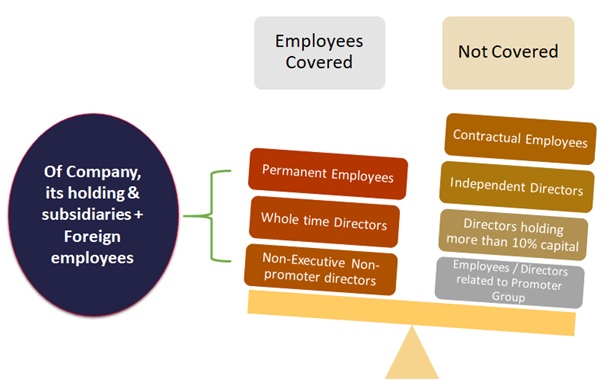 Zerodha (Trading & Demat Account)
Zerodha (Trading & Demat Account)
FREE Equity Delivery and MF
Flat ₹20/trade Intra-day/F&O
 Zerodha (Trading & Demat Account)
Zerodha (Trading & Demat Account)
FREE Equity Delivery and MF
Flat ₹20/trade Intra-day/F&O

|
|
ESOP is a way to reward employees by offering company shares at a discounted rate. NRI ESOP Shares come under the Non-PIS transaction and are taxable in India.
Zerodha (Flat Rs 20 Per Trade)
Invest brokerage-free Equity Delivery and Direct Mutual Funds (truly no brokerage). Pay flat Rs 20 per trade for Intra-day and F&O. Open Instant Account and start trading today.
An employee stock ownership plan (ESOP) is a kind of employee benefit plan which is similar to a profit-sharing plan. Through ESOPs, the company wants to reward or encourage its employees to acquire ownership or stocks in the company.
The company offers ESOP to the employees at discounted costs. The ESOP stocks usually have a lock-in period and thus they cannot be sold immediately. An employee has to be a part of the organization for a specific period before selling the shares allotted as an ESOP.
The ESOP stocks are kept in the ESOP trust fund until the employee exercises them or the options become eligible to exercise or the employee leaves/retires from the company.
Shares allotted under ESOPs to NRIs come under the Non-PIS transaction category. NRIs will need NRI Saving Bank SB accounts, NRI trading and NRI demat accounts to hold or sell such shares.

ESOP to NRI is taxable in India. ESOPs are taxed at 2 instances:
Check NRI Taxation in India (Stocks, Mutual Funds and Derivatives) for more detail about NRI taxation.

Answered on
Yes, NRIs are allowed to open a trading account in India with the sole objective of selling the shares acquired under the ESOP scheme.
The listed Indian Companies are allowed to issue shares under the Employee Stock Option Scheme (ESOP) to the employees who are resident outside India. The shares under ESOP come under the Non-PIS category. Thus, an NRI can open an NRE or NRO trading account along with NRE/NRO Demat and bank account based on whether an NRI wants to acquire the shares with or without repatriation benefits.
An NRI can exercise an ESOP through NRE or NRO trading, bank, and Demat account.
The listed Indian Companies are allowed to issue shares to its employees including employee's resident outside India except to the citizens of Pakistan. The ESOPs are issued with a waiting period known as the vesting period. The vesting period generally ranges from 3-5 years. Once the waiting period is over, an NRI can exercise their right to purchase the shares allotted to them under ESOP at a pre-determined price within a specific timeframe.
The shares under ESOP come in the Non-PIS category. An NRI can purchase the shares by using the funds either from the NRE account or NRO account based on whether the shares are to be held with or without repatriation benefits.
The shares acquired under ESOP are taxed at the time of exercising the stock option. The benefit received as a difference between the Fair Market Value and the value at which the ESOP gets taxed as a perquisite in the hands of the NRI.
Note: Exercising an ESOP is an option and not mandatory. Thus, an NRI may or may not opt to exercise their right to purchase the ESOP at their will.
ESOPs are taxable in India under two instances:
Taxation at the time of exercising the option: The difference between the Fair Market Value and the pre-determined price at which the shares under ESOP are issued is taxed as a perquisite in the hands of the employee as per their income-tax slab.
Taxation at the time of selling the option: The difference between the selling price and the price at which the ESOP was exercised is taxed as a capital gain. The tax rate would depend based on the holding period of the stock and would get taxed as either a Long term Capital Gain or a Short term Capital Gain.

Add a public comment...

FREE Intraday Trading (Eq, F&O)
Flat ₹20 Per Trade in F&O
|
|